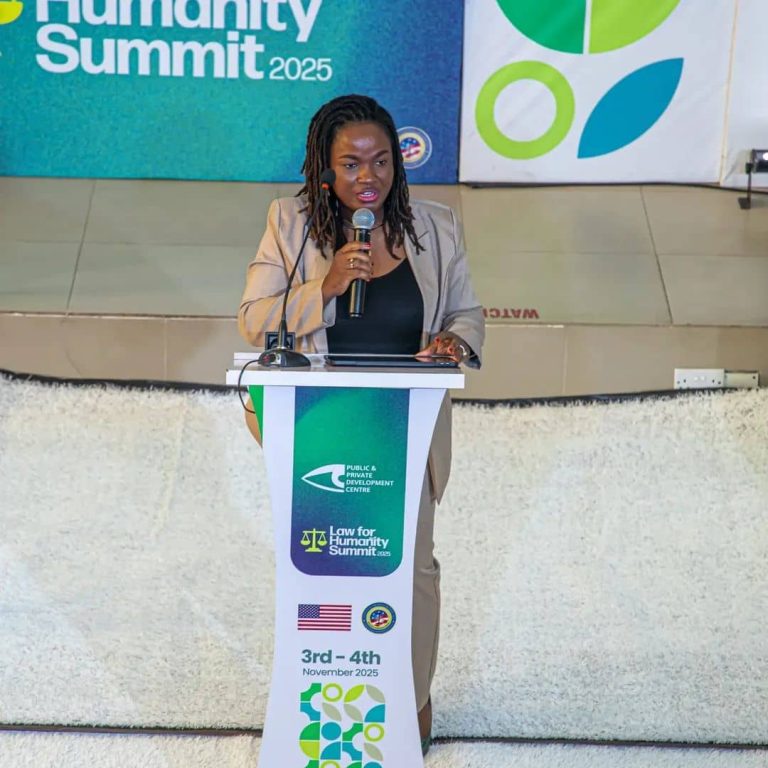The Chief Executive Officer of the Public and Private Development Centre (PPDC), Ms. Lucy Abagi, has urged for stronger partnerships and sustained funding to enhance pro bono legal services and ensure lasting access to justice for indigent Nigerians.
Speaking at the opening ceremony of the 2025 Law for Humanity Summit held on Monday in Abuja, Abagi emphasized that while progress had been achieved in improving access to justice, significant gaps remained that required collective and sustainable action.
She noted that the justice sector could not rely solely on goodwill but must be backed by structured systems, dedicated funding, and institutional commitment to make meaningful progress.
“Pro bono lawyers and duty solicitors continue to serve with passion and conviction, but even the most dedicated advocates can only do so much without sustainable funding and institutional support,” Abagi said.
She stressed the need for increased investment in legal aid programs and justice delivery systems, stating that a fair and inclusive society depends on empowering those who selflessly dedicate their time and expertise to serve others.
According to her, the summit was not just a gathering of professionals but a celebration of service, impact, and humanity expressed through law.
“It is a time for reflection on how, together, we are reshaping Nigeria’s justice delivery through compassion, commitment, and collaboration. Our theme this year, ‘The Quintessential Pro Bono Lawyer: Providing Value Without Compromising Professional Standards,’ speaks to the very essence of ethical legal practice,” she said.
Highlighting the successes of the Reforming Pretrial Detention in Nigeria Project, Phase II (RPDN II) — an initiative led by PPDC and funded by the U.S. Department of State’s Bureau of International Narcotics and Law Enforcement Affairs (INL) — Abagi noted that the project had played a key role in reducing unlawful and prolonged detentions across the country.
She revealed that thousands of Nigerians remain in correctional centers awaiting trial, some for many years, but through the RPDN II project, bold and evidence-driven steps had been taken to address this issue.
“At the heart of these achievements are our pro bono lawyers — men and women who walk into police stations and courtrooms daily to give a voice to those who cannot speak for themselves,” Abagi said.
She applauded their tireless work in challenging unlawful detentions, securing bail for indigent suspects, and preventing miscarriages of justice.
“These legal professionals demonstrate that it is possible to maintain high ethical standards while serving the public interest,” she added.
Abagi noted that through RPDN II, the network of pro bono lawyers had handled thousands of active cases across several states, covering everything from minor offenses to complex human rights violations
She described the lawyers’ contributions as redefining legal professionalism in Nigeria — showing that lawyers are not just interpreters of the law, but defenders of human dignity.
According to her, PPDC has trained over 330 law clinicians from 10 universities, engaged over 200 pro bono lawyers, and 50 police duty solicitors who have provided specialized legal support to indigent citizens.
She further disclosed that 50 young lawyers serving as police duty solicitors across 50 police stations in five states have provided representation for over 15,000 suspects, securing bail for more than 8,500 Nigerians.
“In total, over 5,500 detainees have benefited from free legal representation, with 164 regaining their freedom after years of unjust detention. These numbers represent more than statistics — they are lives restored, families reunited, and renewed faith in justice,” she said.
Looking ahead, Abagi reaffirmed PPDC’s commitment to strengthening pro bono networks nationwide, deepening collaboration with law enforcement agencies, and investing in the capacity of young lawyers and law students to sustain the momentum.
She also disclosed plans to leverage data analytics and technology to monitor pretrial detention trends in real time, ensuring that justice institutions can respond promptly to violations.
“Our vision remains clear — no Nigerian should remain in custody simply because they are poor or unrepresented. We are committed to building a justice system that reflects fairness, accountability, and inclusivity,” Abagi concluded.



